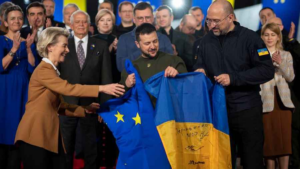The Evolving Economic Saga of Ukraine: A Deep Dive into Western Aid and Economic Warfare

Source: Armstrong Economics
As discussions around international fiscal support mount, no topic stirs more debate and concern than the West’s financial lifeline to Ukraine. In recent times, aid funneled into Ukraine has astonishingly surpassed the nation’s entire GDP—a staggering shift for a country once deemed a "corrupt pariah" by many in the West. Now, as optimism spreads about Ukraine’s financial future, the implications of this support demand a closer examination.
The Financial Undertow
The European Union’s recent proclamation that it has effectively covered Ukraine’s budget deficit for the upcoming fiscal year raises eyebrows. Notably, this support has not come from the deep pockets of Western nations but rather from assets confiscated from Russia at the onset of the conflict. The anticipated transfer of an additional €30 billion from these alleged “stolen Russian funds” claims to eradicate Ukraine’s full deficit amidst ongoing economic uncertainties.
Ukraine’s President Volodymyr Zelensky and EU leaders, including Ursula von der Leyen, President of the European Commission, have hailed this assistance as a hallmark of Western solidarity. Von der Leyen noted that the EU has provided nearly €130 billion to Ukraine, securing economic stability until at least the end of 2025. However, the question remains: Is this aid genuinely altruistic, or is it underpinning a ticking time bomb of financial recklessness?

Source: Armstrong Economics
The Controversial Mechanics of Aid
Words like “giving” and “support” are often tossed around in political discourse, but the reality of this economic aid is darker and more complex. By using confiscated assets from a non-NATO nation during peacetime, the West raises significant ethical and legal questions about economic warfare. This tactic not only dilutes international law but also sends ripples across the global stage—countries like China are closely observing these developments and may reassess their own economic strategies in response.
The G7 nations have positioned themselves to share the financial risks associated with this borrowed strategy, yet the reality is sobering: many naval analysts believe Ukraine’s existence as a nation may be at stake amid such precarious practices. It begs the question: is Zelensky prioritizing his accumulation of wealth over the true welfare of his nation?

Source: Armstrong Economics
Unpacking the Future
Zelensky’s rhetoric around seizing further Russian assets—all but guaranteeing that he will continue to seek substantial military and financial assistance—hints at a troubling trajectory. The ongoing aggression for funds reveals routes to potential dependency and global discontent, as debts to Western nations accumulate. The stark reality is that Ukraine is increasingly becoming financially enmeshed with the very entities that claim to aid it.
With the G7’s approach to economic engagement being less about goodwill and more about strategic positioning in a new era of economic warfare, one has to ponder: What happens when the coffers run dry? Further, with escalating military demands coinciding with soaring debt obligations, one can only imagine the future scenario where the question arises, “Remember when Ukraine was a country?”
Conclusion: Financial Sovereignty at Risk
At Extreme Investor Network, we believe understanding these dynamics is more critical than ever. The economic engagements surrounding Ukraine are not merely a story of assistance; they represent a seismic shift towards using financial leverage as a means to an end. As the global landscape morphs under economic warfare tactics, it’s imperative to stay informed and vigilant. The narrative of Ukraine underscores the larger game of geopolitics at play, urging investors and observers alike to consider the broader implications for global finance and national sovereignty.
Stay tuned as we continue to unpack this evolving story, providing insights that matter right here at the Extreme Investor Network.

